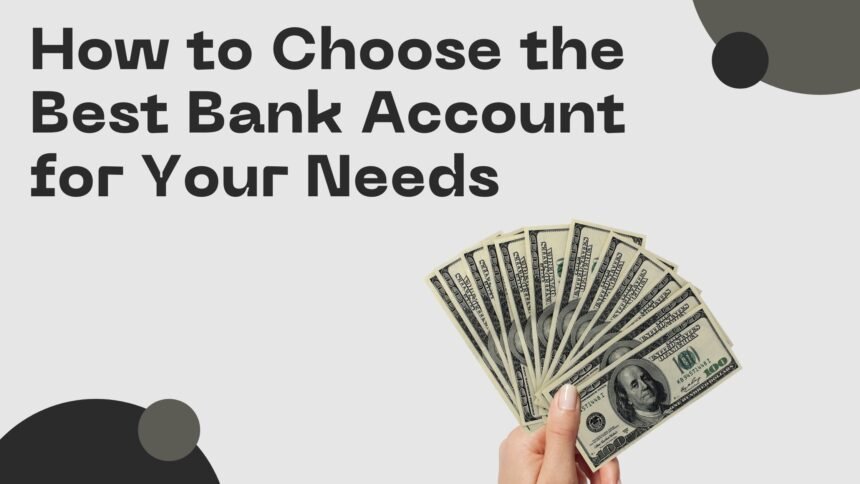Selecting the right bank account can simplify your financial life and even earn you extra money if you find one with good benefits. With the variety of checking and savings accounts available, it pays to do thorough research to find the best fit. This comprehensive guide will walk you through the key factors to consider when choosing a bank account for your needs.
Finding the right bank account for your specific needs is key to optimizing your finances. With the proliferation of checking, savings, money market, and CD accounts out there, how do you choose? This in-depth guide will walk through the major factors to consider when selecting the ideal bank account(s) tailored to your financial profile and priorities.
Assessing Your Banking Profile
The first step is gaining clarity on your banking habits and needs. Ask yourself these questions:
- Transactions – How many monthly transactions do you make – deposits, withdrawals, payments? Do you need an account with unlimited or only basic transactions?
- Account access – Will you do most banking in-person, online, phone, or at ATMs? Consider the features and convenience you need.
- Balances – What is your average and peak account balance? High balances may qualify you for added benefits.
- Cash needs – How much cash access do you require through tellers, ATMs, or cash back? Factor any out-of-network ATM fees.
- Checks – Is a checkbook still a must or can you get by only using debit/credit cards? Some accounts charge for checks.
- Overdrafts – Are you at risk of overdrawing funds occasionally? Seek accounts with overdraft protection.
Gaining clarity on your banking profile makes it easier to narrow suitable accounts.
Key Factors to Compare Between Bank Accounts
Next comes the task of researching options and comparing critical factors that impact costs, earnings, and convenience:
- Minimum balance – How much you must keep to avoid monthly maintenance fees.
- Interest rates – Annual percentage yields earned on savings and CDs.
- ATM network access – Size of fee-free ATM network. Rebates for non-network ATM fees?
- Transaction limits – Any caps on monthly deposits, withdrawals, or transfers?
- Overdraft fees – Costs if the account has insufficient funds to cover payments. Is overdraft protection available?
- Monthly fees – Account maintenance, check writing, overdraft fees. Can any be waived?
- Digital experience – Quality of online/mobile banking and features. Remote deposit, alerts?
| Account Feature | Basic Checking | Preferred Checking | Savings |
|---|---|---|---|
| Minimum Balance | $500 | $5,000 | $300 |
| Interest Rate | None | 0.05% | 0.10% |
| ATM Access | 5,000 | 30,000 | 5,000 |
| Monthly Fee | $3 | $25 | $5 |
Additional Factors to Consider
Beyond the nuts and bolts of account terms, a few other variables may guide your choice:
- Branch locations – Are there branches where you live, work, and travel? Assess geographic coverage.
- Insurance – Accounts are covered up to $250k by FDIC insurance. Credit unions offer NCUA insurance.
- Customer service – Check reviews and test options like live chat, phone support hours, etc.
- Ethical values – Some banks commit to environmental or social causes. Does this matter to you?
- Perks/discounts – Special deals through employers, alumni groups, etc. Existing relationships with a bank?
While not make-or-breaks, these aspects provide additional factors to help differentiate options.
Choosing the Right Bank Account(s)
With your banking habits and priorities clarified, you can zero in on one or more accounts that are ideally suited to your financial life.
For basic transactions, a free checking account with a large ATM network may be sufficient. If you maintain higher balances, a premium checking account can provide additional perks and higher interest earnings.
To maximize interest on savings, shop around for the highest Annual Percentage Yields from online banks, credit unions, or high-yield savings accounts at major banks.
Don’t keep all funds in a basic checking account earning 0% interest. Consider laddering some money into Certificate of Deposit (CD) accounts to benefit from higher interest rates.
Finding the right mix of accounts tailored to your profile will make you financially efficient and give you peace of mind that your money is working optimally for your short and long-term needs.
Frequently Asked Questions
What is the difference between a credit union and a bank?
Credit unions are member-owned nonprofits aimed at serving their account holders. Banks are for-profit businesses that have a wider range of lending products. Credit unions often offer higher interest rates on savings and lower loan rates.
How many bank accounts should I have?
Most people can get by with 1-3 accounts: a checking account, a high-yield online savings account, and perhaps a CD account for longer-term savings goals. More accounts usually mean more monthly fees.
Can I negotiate better rates or fees on bank accounts?
Yes, it’s possible to negotiate lower account fees or higher interest rates on savings/CDs, especially with larger opening deposits. It never hurts to ask a bank rep politely if they have any flexibility.
What happens if I can’t maintain the minimum balance?
You may be subject to monthly maintenance fees if your balance dips below the minimum. Be sure to choose an account with a minimum balance you can reliably maintain.
Can I bank with an online-only bank?
Many top online banks offer the same services and features as national brick-and-mortar banks. If you don’t need in-person branch access, online banks can provide great convenience through mobile apps and often have better interest rates. Just be aware of ATM access when traveling.
Doing your research is the key to finding the perfect bank account. Take the time upfront to understand your banking profile and know what factors are most important to you. A small time investment on the front end will lead to a lifetime of optimized, convenient banking.









